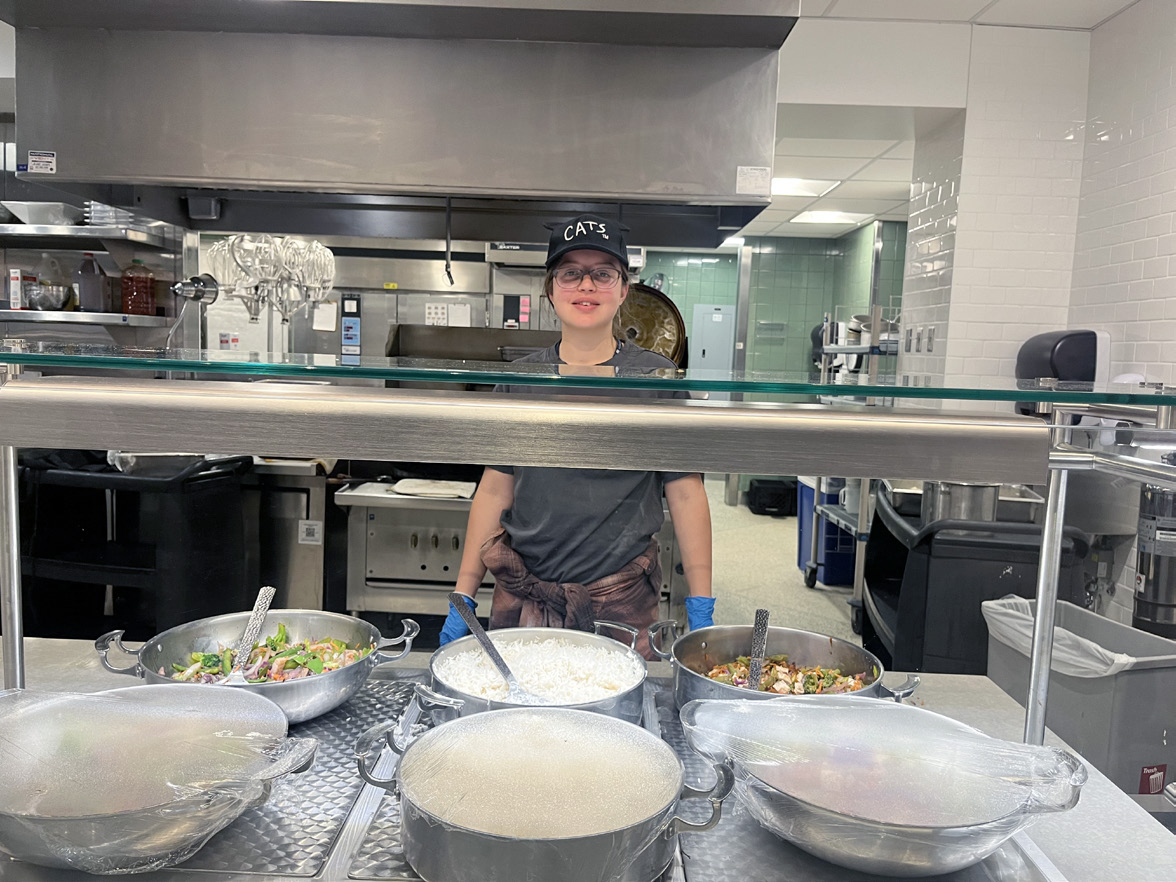Many student workers in the dining hall — and Macalester students as a whole — see Cafe Mac as the least desirable workplace on campus. A few weeks ago, some Cafe Mac student workers came forward to make their workplace issues — and the organizing they are doing to improve their situation — more public.
Many Cafe Mac workers did not receive much or any training before starting the job.
“My first day of work, they gave me a T-shirt, they showed me to the counter and they said, ‘Okay, serve the food,’” Cassandra Zirps ’27, who works at the Grille this year and worked at Cafe Mac last year, said. “I was not given any specific training; I was not told anything about the structure of the kitchen or anything. It’s tough because there’s safety hazards there.”
Ruben Escobar ’25, former Cafe Mac worker and current Grille worker, added that Bon Appétit began training student workers through video tutorials this year. However, Escobar feels that this approach was ineffective. They predicted that incoming student workers would find it difficult not only to remember essential training such as food safety protocols, but also to parse vital information from outdated or extraneous information.
“It’s better than nothing,” Escobar said. “But the overview is also just an info dump and you’ll forget a bunch of it, and some of it gets ignored in our daily operations anyway.”
Henna Schecter ’26, a current Grille worker and former Cafe Mac worker, and one of her co-workers attempted to remedy this lack of training by offering to train workers themselves. However, these plans fell through when management stopped responding to their emails about coordinating these trainings.
“We were told that [management] would be totally on board with that,” Schecter said. “And then they never responded to our emails.”
Zirps and others cited several potential hazards that management failed to warn workers about including cabinets with sharp edges, excessively hot warming cabinets and hotplates and proximity to open ovens.
Zirps has also struggled with a lack of advance notice for scheduling and schedule changes. They indicated that they did not receive a consistent work schedule until after working at Cafe Mac for three weeks. On occasion, she has been told on the day of her shift that she would be working at a new station for which she had no training.
Schecter also noted the “tedious” yet “stressful” nature of the job.
“It might seem like they’re just standing there scooping pasta,” Schecter said. “But they’re also navigating an incredibly fast paced, stressful location with pretty much no training.”
Zirps detailed that they often worked five and a half hour shifts, all of which were spent standing up except for one fifteen-minute break. When workers stationed a chair to the side of their work area, they were told by management that the chair was not allowed.
Additionally, following the Campus Center’s summer renovations, student workers have had to adapt to changes.
“I think the general renovations led to a lot of negatives when it comes to working in the dining hall,” Schecter said.
For instance, a constriction of serving space exacerbated issues with workers’ proximity to heat. Schecter said that a constriction of serving space puts workers closer to open ovens, and the hot plates this year are hotter.
“It was striking how little consideration was placed on the workers,” Zirps said.
Cafe Mac worker Luca Shira ’27 reasoned that, given these challenging conditions unique to working at Cafe Mac, these workers should be paid higher wages than students who get to sit down in temperature-controlled environments and are able to use time for homework.
Amy Tomes, the general manager of Macalester’s branch of Bon Appétit, did not have time to respond to our request for comment.
Shira and other dining hall workers have organized to try to solve some of these issues through petitions in the past, and are planning to advance a new petition this year.
Last school year, dining hall workers organized in an attempt to receive wages on par with what full-time Bon Appétit workers who did the same jobs were making. They also advocated for more comprehensive training before starting their job and changes to scheduling so that no one would be alone on a shift.
They did not get the wins they wanted last year, so workers are mobilizing for many of the same goals this year, with a few differences. For example, they plan to ask for wages higher than what student workers with less-involved jobs get, rather than the same wages as their now-unionized Bon Appétit coworkers.
As of our Sept. 19 interview, Shira and his fellow organizers had not yet written a new petition, as they were still focused on expanding their group of organizers. Shira hopes to get these petitions written, signed and sent to administrators as soon as possible: hopefully, this semester.
Shira appreciates the grassroots nature of petition-based organizing, but notes its downsides too.
“It’s difficult to get people [to talk about the petition] when they’re working, and also we have less legitimacy when we’re just a group of people asking people to sign a petition,” Shira said. “With a union, we would be able to have a direct line of communication with administration to ask for these things.”
While this organizing doesn’t fall explicitly under the Macalester Undergraduate Workers’ Union (MUWU)’s purview because it is dining hall-specific, most of its organizers are involved in MUWU organizing too. They believe that their goals and MUWU’s are aligned, and that wins for Cafe Mac workers would boost MUWU as a whole.
“It’s in line with the general goals of MUWU: unity, better working conditions, higher wages — all the things unions usually fight for,” Zirps said.
Organizers hope that this Cafe Mac-specific organizing will boost support for the union by demonstrating the power that coalitions of student workers can have.
“[We’re trying to] get out there and make [our efforts] as public as possible because part of the campaign is [that] if we win, we can tell people, ‘This is what the union will do for you,’” Shira said. “If we lose, we can still tell people, ‘The college doesn’t want you to have better working conditions.’ So it’s kind of a win-win … I want people to know we want things to be different and also that we’re actively working on that.”
Organizers believe that better working conditions in Cafe Mac would benefit the wider Macalester population. In particular, if Cafe Mac workers received better training on allergens and food safety, Shira and Zirps believe that the dining hall would become a safer place for all Macalester students, especially those with food allergies.
Finally, better working conditions — and a union — would give Cafe Mac workers a better experience overall.
“The most important part about it is that workers [would] have a say in their workplace,” Shira said. “We need more democratic workplaces. Especially in places like Cafe Mac where a lot of people here are low-income [and where many] marginalized students are working. It’s very important for them to have a voice.”














